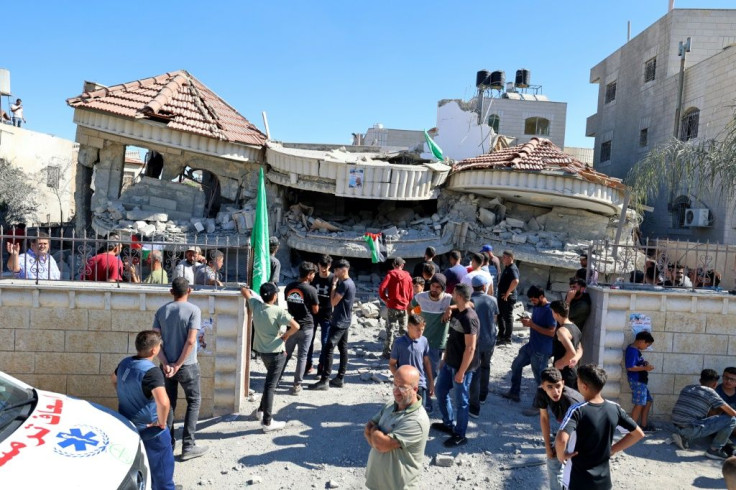Israel Razes Home Of Palestinian-American Shooting Suspect
Israel's army said Thursday it had demolished the home of a Palestinian man with US citizenship accused of fatally shooting a Jewish student in the occupied West Bank.
The move was denounced by the United States, which said the punitive demolitions of Palestinian homes "exacerbate tensions and undercut efforts to advance a negotiated two-state solution".
An Israeli army spokesman confirmed that "troops demolished the residence of the terrorist [Montasser] Shalabi, in the village of Turmus Ayya, northeast of Ramallah".
Shalabi, 44, was arrested by Israeli forces in May after he allegedly fired on waiting passengers at a bus stop at Tapuah junction south of Nablus in the northern West Bank.
The attack killed Yehuda Guetta, 19, a student at a seminary in the Itamar settlement, and wounded two of his friends.
Shalabi is in detention but has not yet been convicted.

The demolition came after Israel's top court rejected an appeal by Shalabi's estranged wife, who claimed that his life centred on the United States and that he made only occasional visits to the West Bank house.
The Supreme Court accepted the state's position that the home belonged to Montasser Shalabi and that he spent time in it when he was in the West Bank, ruling that the army was therefore justified in carrying out a punitive measure at the property.
Sanaa Shalabi, 40, told AFP that troops first arrived at 1:00 am to place explosives around her home. The demolition operation lasted through the night and into the morning.
"This is our life. What happened to us is normal. We were prepared for it," she said, and called her husband a "hero".

Israel believes that demolishing homes of assailants deters such attacks in the future, but critics denounce the practice as unjustified collective punishment that often sees children lose their homes over the conduct of a parent or other relative.
The army said that during the demolition "approximately 200 rioters hurled rocks and launched fireworks" at troops, who responded with "riot dispersal means".
Montasser Shalabi did not live in the home that was destroyed, according to the Israeli human rights organisation Hamoked, which unsuccessfully contested its demolition before Israel's Supreme Court with Sanaa Shalabi.
Executive director Jessica Montell said the couple were estranged. Sanaa Shalabi lived in the home with three of their seven children. The whole family are also US nationals.
"The man accused of the attack doesn't live in the house," Montell said, adding that he lived in the United States and would come "once or twice a year".
Sanaa "was not in any way involved and didn't know anything about the attack. We thought this should be grounds for not demolishing or just demolishing one room," she added.
She said Montasser Shalabi suffered from mental illness, a claim that was raised in the court petition as well but was rejected by the justices, who said he was examined after the attack and found to be mentally sound.
The demolition of homes and Israel's overall conduct in the occupied West Bank is likely to cause friction between the US administration of President Joe Biden and Israel's new Prime Minister Naftali Bennett, a hardline nationalist who previously ran a West Bank settler lobby council.
Secretary of State Antony Blinken raised concern directly in talks with senior Israeli officials in recent years, State Department spokesman Ned Price told reporters in Washington.
"As we've said numerous times now, the home of an entire family should not be demolished for the actions of one individual," Price said, vowing that the Biden administration would keep raising the issue so long as demolitions continue.
A source in Bennett's office said that while the premier "respects and appreciates the US administration", his decisions were guided solely by "the security needs of Israel and to protect the lives of Israeli civilians".
© Copyright AFP 2024. All rights reserved.





















